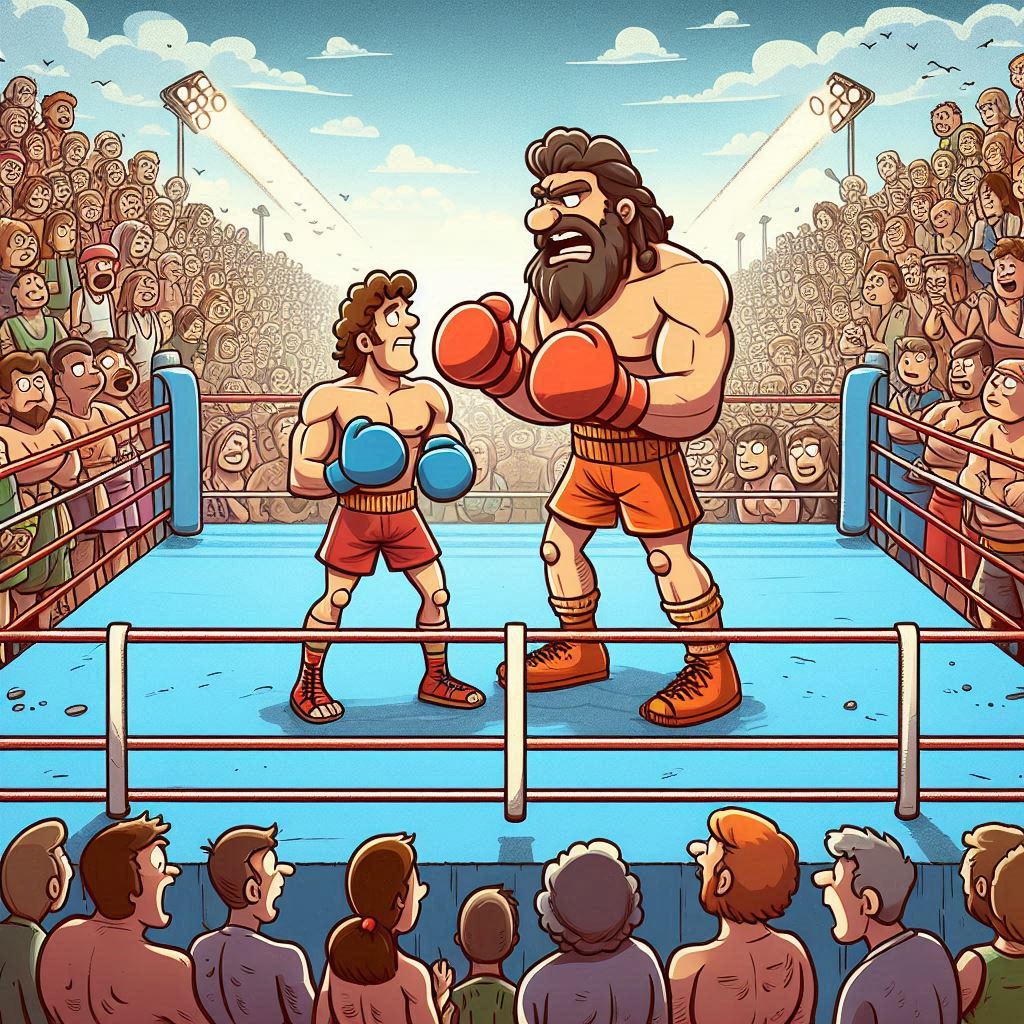David and Goliath – Is There Still Space in Business for the Little Guy?
In today’s newsletter:
- David and Goliath – Is There Still Space in Business for the Little Guy?
- Oil Bubbles Up, Market Watch, and Black Friday
- Daystar in Hot Water: Christian Businesses Need to Align with Christ
Merck made $60 billion in 2023. Amazon made half a trillion dollars. Walmart managed to bring in over $600 billion.
Let’s put that number into perspective. Walmart’s revenue last year was greater than the gross national product of most countries in the world, surpassing the GDP of countries like Nigeria, Norway, Sweden, Israel, and South Africa. If Walmart was a country, it would have had the number 23 GDP in the world, just behind Argentina.
Our little nation of Walmart (with its blue and yellow, smiley face flag, of course) boasts 2.1 million employees (¾ of them in the United States), hundreds of billions of dollars in assets, and at this point, they aren’t just in retail. They are in international shipping, finance and lending, analytics, and much, much more.
If you are an entrepreneurial-minded individual, then trying to compete in a space dominated by the likes of Amazon, Apple, or Walmart, a reasonable question emerges:
Why try? Is winning against these giants even possible?
Spoiler alert, the answer is “Yes!” Winning is possible, but it means we have to reshape how we think about the iconic contest of David vs. Goliath. Then, with a long-term strategy, responsiveness to the market, and just a bit of luck, even the little guy can come out on top.
Here’s how.
Malcolm Gladwell and Rethinking the Narrative
If you’ve never read David and Goliath: Underdogs, Misfits, and the Art of Battling Giants by Malcolm Gladwell, put it at the top of your list. It’s a wonderful exposition of how we often analyze power imbalances incorrectly in a competitive situation, by over-emphasizing certain advantages and overlooking other advantages entirely.
There’s quite a lot to the book, but a few things immediately stand out, with relevant application to your business and strategy:
“Suppose you were to total up all the wars over the past two hundred years that occurred between very large and very small countries… one side has to be at least ten times larger in population and armed might than the other. How often do you think the bigger side wins? Most of us, I think, would put that number at close to 100 percent… But the actual answer may surprise you… 71.5 percent. Just under a third of the time, the weaker country wins.” – Malcolm Gladwell, David and Goliath, ch. 1 sec. 2.
That should give the little guy hope in any contest, but Gladwell goes on to explain that the data reveals something even more surprising. When the weaker side refuses to play by the conventional rules of the day and instead fights using guerilla tactics or other unconventional methods, all of a sudden the weaker side has the advantage. The smaller country wins in 63.6% of those cases.
How is that possible? Because there is a downside to every advantage and an upside to every disadvantage if you have the courage to embrace your strengths instead of envying those of your opponent.
In the story of David vs. Goliath, Goliath clearly anticipated a warrior who would descend to the valley floor and fight him up close in hand-to-hand combat. Instead, David read the situation properly. He was excellent with a sling – which was no mere child’s toy, but a deadly projectile weapon often used in ancient battles. He knew he would get crushed in a close-quarters contest with the lumbering giant before him, so he got just close enough to aim, and he put a rock into his enemy’s head.
Paradoxically, Goliath never stood a chance.
Taking on the Giants and Winning
Amazon is the 800lb gorilla today, but a couple of decades ago, they were an internet start-up company selling books at a loss and racking up eye-watering levels of debt. How could little ol’ Amazon ever hope to compete against the likes of Barnes and Noble, with their hundreds of beautiful stores, tremendous brand recognition, and exclusive deals with publishers?
They did it the same way David defeated Goliath: They went about the contest their own way. Jeff Bezos did not try to build more stores than Barnes and Noble, to have better in-store cafes, or to outdo them in any of the traditional methods of bookselling. Instead, Amazon treated itself as a technology company first and foremost and embraced the advantage of not having physical brick-and-mortar distribution. You would think that not having physical stores would be a disadvantage, and in a way it is, but Bezos saw the problem differently.
Books are a unique category, in that properly supplying them means hundreds of thousands – even millions – of titles. A physical store can’t possibly display all of them, and it’s quite a bit of difficult, uncertain work choosing which titles will be in demand at any given time. Bezos saw that an internet-based bookseller could get around this problem and just offer everything at all times. When coupled with a low-price model, a platform that allowed small businesses to sell through them, and some savvy financial footwork, Amazon came out ahead – in a big way.
They embraced their disadvantages and fought on a playing field that made their competitor’s advantages far less relevant.
Or take Apple for example. In the 90s, Apple was on the verge of bankruptcy, and Bill Gates went on the record to say he “couldn’t imagine a situation in which Apple would ever be bigger and more profitable than Microsoft” and that Steve Jobs “knows he can’t win.”
Indeed, Apple was in big, big trouble, and Microsoft was a giant towering over them. So instead of pretending to be the mainstream, Apple embraced its disadvantage and put out a brand image of being artsy, of being the outsider, the cool misfit, the avant-garde.
Sure, a string of revolutionary products helped to make this happen as well, but Apple’s success was largely one of brilliant design, packaging, and branding. Apple did not invent .mp3 players, but they made them cool. Laptops were not new, but Apple convinced a generation that their laptops were what a college student really needed.
Yes, Microsoft was number one, but Apple’s message was this: Isn’t that dull? The real innovators, thinkers, creators, and geniuses use Apple.
Remember the Mac and PC ads? This campaign was everything, and it helped them leapfrog the competition to where now they are the most highly valued company in the world.
They saw the advantages of their disadvantage, and they ran with it.
Netflix beat Blockbuster. Starbucks invaded Australia in 2008 – and local coffee shops beat the tar out of them. Facebook was once a one-man operation competing against the giant of Myspace, and Facebook crushed them. If you want an example of a really small operation winning out – look no further than our profile of Skip Ireland here, and how he took a small office supply company and managed to chisel out a healthy chunk of market share against the big box retailers that shuttered small businesses all over the country.
How to Win and Carve Out Your Niche
While there are obviously huge advantages to being number one, it is also expensive, difficult, and requires a lot of attention – that means that regardless of your industry, there is probably an opportunity for challengers to make their mark. It does, however, require a little bit of thinking outside of the box.
There are two things that you have to do, and then build an actionable plan forward based on what you find.
#1: Make a list of what your competitor does not have that you do have
It could be:
– The ability to “make exceptions” and be flexible with policy on a case-by-case basis
– Speed
– Personal touch
– A smaller operating budget that makes small accounts worth it to you, and not worth it to them
– Innovation and creativity
– A particular brand or market association
– Proprietary products or information
– Etc.
#2: Make a list of what your competitor has that you do not have.
Don’t sigh in despair – we’re thinking strategically. If you aren’t tied down by the things that tie down your competition, you can find an advantage.
What does your competitor have that is a drag on its resources, customer care, efficiency, marketing, innovation, speed to market, etc.?
If you enjoy the lack of that thing, you’ve found an advantage to lean into.
It could be:
– A large staff/overhead
– A national brand
– Access to more cost-effective inputs (perhaps this results in lower quality?)
– Real estate
– Celebrity endorsements
– Etc.
Remember, the rental car company Avis made an entire brand out of not being the top rental car company with their famous, “We’re number two. We try harder,” campaigns.
Flip traditional thinking on its head. Find advantages where others will overlook them. Once you have your two lists together, take a good hard look and come up with an approach that makes you David, and everybody else a giant sitting duck.

“It was all set to go down in the Valley of Elah, but then Goliath’s agent got involved, and anyway, turns out there’s a lot more money in Vegas.”
Fun Fact
(In Partnership with Fidelitas)
Did you know the brains behind Sent To Win run a full-service marketing and PR agency? If you need help scaling your business profitably, you need to connect with Fidelitas.
Fidelitas has been helping small businesses, churches, non-profits, publicly traded companies, and even professional sports teams win for over 16 years. Fidelitas leads by serving as a Strategic Partner and prides itself on producing measurable results for its clients.
Check them out here or email Tyler@Fidelitas.co to connect directly with the CEO.
INDUSTRY INSIGHTS
Oil Bubbles Up, Market Watch, and Black Friday
Oil Bubbles Up
Gasoline prices have edged upward in recent weeks, for a variety of reasons, including conflict in the Middle East and the looming threat of “sticky” inflation. A large supply and a lackluster demand is helping to keep prices lower than they would otherwise be, but other factors may soon change the situation. President Trump’s promised 25% tariff on Canada is projected to disrupt the price stability of the U.S. oil market if it takes effect, and Trump says he will not include an oil exemption in the tariffs. Canada is currently the U.S.’s largest source of imported oil, at times representing nearly 2/3 of all oil imports into the U.S. Different regions of the U.S. will not be affected equally, however, as these tariffs will likely have the biggest impact on the Great Lakes region, the Midwest, and parts of the West Coast and Rocky Mountains. For his part, billionaire Bill Ackman said on X that these tariffs are merely smart political maneuvering to get Canada (and Mexico) to stop the flow of fentanyl and illegal immigrants into the U.S., and that the tariffs will likely not ever take effect.
Market Watch
As of Monday, the Dow Jones had slipped slightly, edging down after reaching record highs. NASDAQ, however, gains a new high, in part driven by the performance of Tesla and Intel. Not coincidentally, Intel CEO Pat Gelsinger announced his retirement effective as of December 1st – a move generally approved of by investors, it seems, as Intel has lost tremendous ground during his 4-year tenure. The average 30-year-fixed mortgage rate dropped 7 basis points this week, sitting at just above 6.9%. Gold has dropped one percent as of Monday as the dollar strengthens, though it remains in historically high territory. Reporting from CBS News suggests that gold will continue its bull market, despite the dip. If you’ve noticed your daily cup of coffee getting more expensive, it isn’t just you: Coffee sits close to its highest price in 50 years due to concerns with the Brazilian crop, making it one of the best-performing commodities of the year. Coffee has risen 71% on the year, while cocoa has doubled.
Black Friday
Despite retailers’ and economists’ fears of a lackluster holiday shopping season, Americans are still very much taking part in Black Friday, albeit mostly online. This past Friday saw a record-breaking $10.8 billion in online spend, up a cool billion from roughly $9.8 billion last year. This is fully double the online spend of consumers in 2017. Just shy of 70% of Black Friday online sales were made via smartphone. Tracking in-store spending is a bit more difficult, and some of the analytics reporting varies. For example, Mastercard suggests a 0.7% increase in in-person Black Friday sales this year, while Facteus shows a decrease of 5.4%. Either way, when one factors in inflation, this looks like a loss for in-person sales compared with last year, though growth in online sales still drives an overall growth of around 3.4%. Retail Dive says this Black Friday’s “winners” are e-commerce, AI assistants, and toys, while this year’s “losers” are in-store shopping, retailer margins, and Black Friday itself, due to increased online shopping on Thanksgiving day. ABC lists what toys and products were big sellers this year.
Sunday School
Q: Where can you find Jesus’ genealogy in the Bible?
A: In two places: Matthew 1:1-17 and Luke 3:23-38. These genealogies differ from one another quite a bit for parts of the genealogy. There are various theories as to why, but one prominent idea is that Matthew records Jesus’ lineage from a legal standpoint, so it includes adoptions and levirate marriages, while Luke records Jesus’ biological lineage. Both lead back to King David.
TIPS & TRICKS
Daystar in Hot Water: Christian Businesses Need to Align with Christ
Whoever said that all press is good press hasn’t heard about Daystar TV, a Christian broadcasting company recently embroiled in scandals. Their example is a tragic one, and still unfolding, but it serves as a good reminder for companies who would label themselves with Christ’s name to be above reproach – or else be their own undoing. The key issue here is something called “misalignment,” and you want to make sure it’s never something you allow to happen in your own organization.
What Happened
Intrepid Christian journalist Julie Roys recently broke a story of an alleged cover-up at a Christian Network (classified as a church for tax purposes). If you’d like to follow the story closely, you can read the details here and here. The allegations are, in short, that Daystar founders Marcus (now deceased) and Joni Lamb have repeatedly tried to intimidate, bully, harass, and spiritually manipulate their own children into not reporting sexual abuse against their own granddaughter by a Daystar employee, for the sake of maintaining the ministry’s image.
Recently, son Jonathan Lamb and his wife Suzy Lamb have been removed from the board and fired from their jobs at the station, allegedly in retaliation for seeking justice for their daughter.
It’s a salacious and ugly story, and it is outside of the purview of this publication to get into the nitty-gritty. What we want to focus on is the fallout and the grave warning each of us should take into our own businesses:
Your sin will find you out, so operate your company in such a way as to be above reproach – ESPECIALLY if you claim the name of Christ in your business or ministry.
Fallout
“For there is nothing hidden that will not be disclosed, and nothing concealed that will not be known or brought out into the open.” – Jesus (Luke 8:17)
Though Joni Lamb and other senior leadership at Daystar have attempted to do damage control in recent days, (in part through accusing Jonathan Lamb of blackmail – a claim easily refuted by police reports, email documentation, and audio recordings) people are taking notice that this TV station supposedly dedicated to spreading the love of Christ seems to be acting, well, pretty evil.
In addition to Suzy and Jonathan, they have also lost on-air host Laura Lynn Tyler Thompson, who resigned in disgust last week due to the pervasive moral failures of senior leadership, especially their failure “as parents.” Time will tell if others follow.
On X, Daystar and Joni are getting a lot of attention, and not in a good way, as they now threaten legal action against whistleblowers and reporters. The clean-cut image is fading fast.
This is a clear example of misalignment – Daystar operates off of a reputation of doing the Lord’s work, of being anointed, and of being a force upholding good in the world. Now, however, there is a growing perception among their target audience that all of that is just a façade, and that in reality, Daystar is about money, power, and fame.
Misalignment is a crushing blow to any business, and as this case study shows, you typically can’t deny your way out of the situation. If the allegations are true (and the other scandals that have come from Daystar in recent years), then the big strategic mistake that leadership is currently making is that they are treating a culture problem like a PR or a messaging problem. You can never escape the reality of a situation for long, and what Daystar’s angry viewers and talent would require is not another smiling press release, more denials, or pretending the issue away; what is required is actually fixing the problem – which means telling the truth, seeking justice, and protecting the innocent. Daystar trades in telling others how to live, and that credibility is shot to pieces when this sort of family drama is going on.
If you proclaim fitness and clean eating, your company picnics better serve healthy food. If you trade off of an image of transparency and openness, you better open your books when critics come calling. And if you claim the name of Christ in your business, well, you better make sure you’re acting like Him.
No one likes a hypocrite, but the younger generation in particular holds “authenticity” to be their highest value, according to some studies. Unless some real changes are made and some sincere apologies and restitution are given, Daystar is likely to continue bleeding viewers, business partners, etc.
Alignment in your business and messaging is not only the right thing to do, it is also necessary for long-term viability in the marketplace. I’ll leave you with the words of the apostle Paul:
“You, therefore, who teach another, do you not teach yourself? You who preach that a man should not steal, do you steal? You who say, ‘Do not commit adultery,’ do you commit adultery? You who abhor idols, do you rob temples? You who make your boast in the law, do you dishonor God through breaking the law? For ‘the name of God is blasphemed among the Gentiles because of you,’ as it is written.” – Paul of Tarsus, Romans 2:21-24
Quick Hits
- Walmart is now the latest large corporation to roll back their DEI policies, signaling a shift in US politics and culture.
- GE Vernova’s mini nuclear reactors are set to produce big profits; their stock has already doubled in just over a year.
- Bible sales jump 22% this year, a dramatic rise attributed to widespread anxiety, a search for hope, and new versions and marketing efforts.
- TikTok is getting into the book publishing business. It’s not as crazy as it sounds.
- Disney’s box office fortunes have turned around: Moana 2 sets record for biggest Thanksgiving release ever.
- YouVersion revealed the app’s most popular Bible verse this year: Philippians 4:6, a scripture about anxiety.
Our “David and Goliath” graphic was generated using AI prompts. Guess the prompt for your chance to win Sent To Win gear. Just reply to this email with your best guess.
For Kingdom Leaders, By Kingdom Leaders
Bringing Kingdom-minded leaders like you fresh perspectives and insights on business, finance, and leadership trends.









